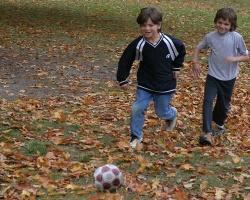“In the oft-quoted “Birches,” Robert Frost muses about a boy who lives too far from town to learn baseball so instead spends time in the woods swinging in the trees. “He always kept his poise / to the top branches, climbing carefully / with the same pains you use to fill a cup / up to the brim, and even above the brim,” Frost writes. “Then he flung outward, feet first, with a swish, / kicking his way down through the air to the ground.”
This sort of unstructured, imaginative play is increasingly lacking in an indoor, scheduled world–to children’s great detriment, argues Richard Louv, author of Last Child in the Woods, a book that explores research linking the absence of nature in children’s lives to rising rates of obesity, attention disorders, and depression. New evidence of the lack: a recent study that shows visits to national parks are down by as much as 25 percent since 1987. U.S. News spoke with Louv about the study and the emergence of “nature deficit disorder.”




